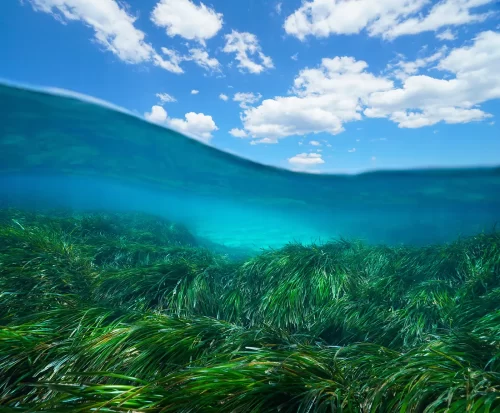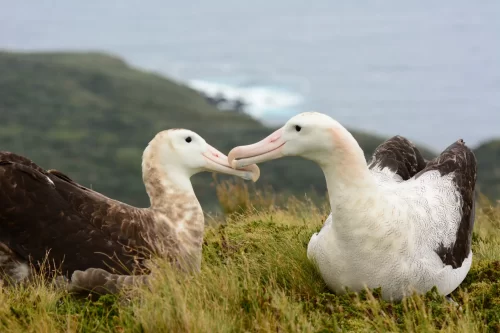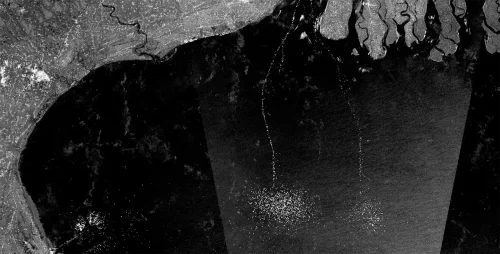JOINT STATEMENT FROM THE REPUBLIC OF INDONESIA AND GLOBAL FISHING WATCH, INC.
JUNE, 2017
The Republic of Indonesia and Global Fishing Watch, Inc.* have entered into a partnership to deliver Vessel Monitoring System (VMS) data for all Indonesian flagged fishing vessels in a publicly-available data platform. We believe the public sharing of VMS data should be the global standard for transparency in the fishing industry.
Minister of Marine Affairs and Fisheries for the Republic of Indonesia, Susi Pudjiastuti, is calling on all coastal nations to follow her unprecedented example in publicly sharing her country’s VMS data.
Global Fishing Watch is committed to processing and publishing VMS data from any nation committed to taking this same bold step toward transparency in what remains the among the most opaque sectors of the global economy.
An Urgent Need for Transparency
Worldwide, more than 3.1 billion people rely on seafood for almost 20 percent of their average per-capita intake of animal protein, and more than half of fish exports by value originate in developing countries. The lack of transparency in the fishing industry prevents informed resource management decisions, and has led to rampant Illegal, Unreported and Unregulated (IUU) fishing that undermines sustainable management, impacts food security and directly affects the global economy. The opaque nature of commercial fishing, which occurs over the horizon and out of sight, also facilitates other illegal activity such as drug and human trafficking and slave labor.
Complete transparency through the public exchange of VMS data would assist countries in better monitoring their territorial waters and facilitate cooperative regional surveillance and enforcement. Increased transparency will benefit the oceans and the fishing industry by improving management decisions and strategies, and providing market benefits to seafood suppliers through validation of product source.
The partnership
Indonesia is the second largest wild-captured seafood producer in the world. Minister Susi’s aggressive stance against IUU fishing in Indonesian waters has curbed illegal activity and boosted fish stocks over the last two years. With this partnership, Indonesia becomes the first nation ever to allow the public dissemination of their proprietary VMS data.
Global Fishing Watch receives and processes openly-broadcast Automatic Identification System (AIS) data from ships at sea. Using machine learning and cloud computing, Global Fishing Watch analyzes general patterns of vessel behavior to identify and display commercial fishing activity through a web-based interactive data-mapping platform.
Using the algorithms developed for AIS technology, Global Fishing Watch has been processing and analyzing Indonesian VMS data from 2014 to the present, and will continue to receive newly created Indonesian VMS Data daily. Detailed vessel behavior analysis is now displayed through the Global Fishing Watch public mapping platform.
Value of Sharing VMS Data
Originally designed as a collision avoidance tool, AIS data provides detailed information for the majority of the industrial-sized commercial fishing activity throughout the oceans. It is broadcast on open channels and received by satellites or ground-based radio receivers. However, there are limitations and challenges to adapting the technology for use in vessel monitoring and tracking, especially in areas of high vessel density where signal interference can cause drop-outs in coverage.
VMS, however, was designed specifically for use by governments to monitor and track vessels, and is required by all nations. It provides more consistent and reliable coverage than AIS, but the proprietary data is owned by the governments that collect it. What’s more, AIS use is required primarily on industrial-sized vessels (those exceeding 300 Gross Tonnage) whereas flag states generally have a lower size threshold for VMS usage. Indonesia requires VMS on all vessels exceeding 30 Gross Tonnage.
Indonesia’s VMS data includes nearly 5,000 medium-sized commercial fishing vessels that are not required to carry AIS, and are therefore not reliably trackable by any other means.Their inclusion in the Global Fishing Watch database reveals commercial fishing in vast areas of the ocean where it had previously been invisible.
International Solution is Needed
Management of the world’s seafood resources is a pan-national concern. Fish, blind to international boundaries, often hunt, breed and migrate through the waters of multiple nations. Distant water fleets harvest from exclusive economic zones thousands of miles from their home port. Poor understanding of how and where fishing occurs along with rampant IUU activities threaten the resources of coastal nations, which must rely on each other to effectively manage and regulate their fishing fleets.
It is only through international cooperation and trans-border collaboration, informed by a global understanding of fishing fleet activities and interactions, that ocean resources can be effectively and sustainably managed for the future.
In applying the analytical tools developed for AIS data to previously unavailable VMS data for any nation, Global Fishing Watch can provide a deeper understanding of vessel traffic that will aid international, collaborative efforts at developing more informed policy, improving enforcement and gaining a more comprehensive o of fishing activity throughout the world.
Minister Susi’s call for open VMS data from all fishing nations is poised to establish a standard of complete transparency that will allow resource managers and enforcement bodies to effectively govern the world’s common ocean resource. This move is an indispensable step toward the long-term sustainability of fisheries, food security and global economic stability.
* Global Fishing Watch is an independent 501(c)(3) that was founded and supported by Oceana, SkyTruth and Google. GlobalFishingWatch.org


